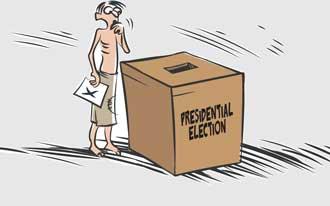Reply To:
Name - Reply Comment
 The Commissioner of Elections has announced presidential elections between 17 September and 16 October this year. However, many a citizen and political parties of the opposition have hinted at a possible delay or indefinite postponement of the expected election.
The Commissioner of Elections has announced presidential elections between 17 September and 16 October this year. However, many a citizen and political parties of the opposition have hinted at a possible delay or indefinite postponement of the expected election.
Many of us also remember that while the Office of the Commissioner announced local government and provincial council elections would be held some years ago,those elections were never held. Today, only passing mention is made of these nonevents, but then they were not Constitutional requirements.
So why is there an air of expectancy that presidential elections will be held this time around?
For one both government and opposition leaders are providing relief measures to the electorate.
The president has been putting in place legislation for the provision of land to landless families.In a unique move, he has proposed designating areas occupied by plantation workers in estates managed by the State Plantation Corporation as new settlement villages and legislation to make this a reality is to be drawn up.
Under the initiative it means plantation workers will for the first time, secure land rights on the estates they work. Under the “Urumaya” programme –which aims to provide title deeds to 2 million landless families- he has already commenced distributing title deeds to a number of families.Earlier this month, the government announced electricity tariffs were to be lowered by 21.9%. In February 2023 the board raised prices by 66%. That increase came shortly after the government raised electricity tariffs by 75% percent the previous year, again in a bid to achieve targets set by the International Monetary Fund (IMF) to provide a bailout for our crisis-stricken economy. In comparison to the increases in the tariff (approx. 114%), the reduction is minimal but will undoubtedly help badly hit monthly paid wage earners. The Government has also announced the tariff on pipe-borne water would be reduced later this month. Again while the reduction in cost will be minimal compared to past increases in tariff, it helps in bringing down the cost of living. In the long run, putting more food on the plates of an impoverished population. Earlier, on 30 June the Ceylon Petroleum Corporation (CPC) announced an adjustment in fuel prices, with the price of 92 Octane Petrol reduced by Rs. 11.
In April this year the country’s primary gas distributor, Litro Gas Lanka announced a reduction in the prices of its domestic LP Gas.
The president also played a leading role regarding the payment of increased wages to the tea and rubber plantation workers, angering the business community.
Past governments, despite promises of raising wages of this section of the community, were unable to raise their wage to a paltry Rs. 1,000 per day. The incumbent government had legislation passed to increase the wage to Rs. 1,700 per day. Opposition leader -Sajith Premadasa- too has been traversing the country making donations -using funds he has raised for the purpose. He has concentrated on the education of children. In the meanwhile the leader of the Marxist coalition –Anura Kumara Dissanayake- like his predecessors the LSSP and the CP, looks askance at the provision of title deeds to landless families. He has concentrated on making high-profile visits to party supporters in foreign countries, meeting diplomats of foreign embassies and even meeting high-ranking members of governments in foreign lands. In an earlier era, the Marxists and other political parties laughed at Ranasinghe Premadasa’s ‘one million housing programme’ referring to them derogatorily as ‘match boxes’. What the then ‘Marxists’ forgot was that for people who owned no houses and lived in temporary structures, even the ‘match box house’ was a big deal. When he contested the presidency R. Premadasa already created a huge voter bank. Similarly, in today’s context for landless peasants and workers who will soon own title to their properties, this is a huge plus. Their gratitude represents a near four million votes to the incumbent president. To the families living in the tea and rubber plantations who could have never dreamed of owning land, it’s a dream come true. Demanding unpayable wage increases in the long run may turn out counterproductive, to those behind the call. People need answers to their problems… Not empty dreams and promises.